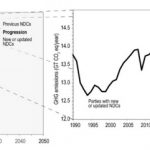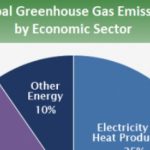Getting an issue on the agenda of a COP is essential for its chances of being dealt with properly. Jennifer Allan at Cardiff University and Rishikesh Ram Bhandary at Boston University, writing for Carbon Brief, have analysed 218 agendas, tracking 502 agenda sub-items, going back to the first COP in Berlin in 1995. Certain agendas stand out – Adaptation, Mitigation, Finance, Transparency, Technology, Capacity Building, Response Measures, … [Read more...]
Paris Agreement “Global Stocktake” should focus on individual nations too
It’s time for national governments to focus on the short-term domestic actions needed to meet their 1.5°C goals, argue Anna Pérez Català, Henri Waisman, Marta Torres Gunfaus and Ariadna Anisimov at IDDRI. Analyses of emissions gaps at a collective and global level won’t be enough, the current purpose of the Global Stocktake (GST) of the Paris Agreement. The first GST runs from 2021 to 2023 and the process will be repeated every 5 years. The … [Read more...]
Renewed interest in Carbon Capture strategies for net-zero: targets, obstacles, costs, priorities
Martina Lyons at IRENA picks out the highlights of their new report “Reaching Zero with Renewables: Capturing Carbon”. Carbon capture is going to be expensive, so should be focussed on hard-to-abate industrial sectors, as well as bioenergy plants. Lyons breaks down the target carbon capture volumes, costs and the investments required, as well as looking at the consequences of different strategies and carbon prices. Scaling up this technology, … [Read more...]
Updated NDCs: World committing to 0.5% emissions cuts by 2030. It should be 45%
The latest national climate pledges, submitted over the new year, show that the world is nowhere near meeting our emissions reductions goals. Analysis of the 48 updated “nationally determined contributions” (NDCs) submitted so far (everyone must submit by the end of this year), covering nations responsible for 29% of global emissions, shows we will have 0.5% lower emissions in 2030 compared to 2010. That’s way off the target 45% reduction needed. … [Read more...]
Coastal town Grande-Synthe took France to court over missed climate targets. How, why and what happens next
Taking your own government to court is an indispensable tool for sticking to our climate goals, says Lucien Chabason at the IDDRI. In November, the French State Council (Conseil d'État) gave an interim judgment largely favourable to the municipality/commune of Grande-Synthe following the government's implicit refusal to take additional measures to comply with the Paris Climate Agreement. Grande-Synthe sits on the coast by Dunkirk and is at … [Read more...]
NDC reporting: making the Paris Agreement Transparency Framework work
For the system of Nationally Determined Contributions (NDCs) to be effective, every country’s reporting processes need to be appropriate to their economic level, honest and accurate. That means the Paris Agreement’s Transparency Framework, including the Common Reporting Tables (CRT) for greenhouse gas inventories, and Common Tabular Formats (CTF) to track progress on their NDCs, needs to be finalised and agreed upon, and fast, says the IDDRI’s … [Read more...]
Global ‘sectoral’ treaties, legally binding corporate targets can turn around emissions rise
The United Nations Framework Convention on Climate Change started with a top-down legally binding Kyoto Protocol and ended up with a bottom-up ‘self-determined’ voluntary Paris Agreement, says Chandra Bhushan. As a result, nobody has the tools to drive global collective action to combat climate change. The author says that’s why emissions are at record levels. He recommends international ‘sectoral’ treaties to achieve real transition in energy, … [Read more...]
The EU’s climate strategy for Paris: recipe for another failure?
The European Commission has proposed a strategy for the Paris climate talks that includes the aim of achieving a “Paris Protocol”. According to Susanne Dröge and Oliver Geden of the German Institute for International and Security Affairs (SWP) in Berlin, this strategy does not take into account the new global context of the negotiations. They urge the EU to drop the word “protocol”, consider how to align the international process with internal EU … [Read more...]
Dutch court’s climate ruling may force other states to cut emissions – or else
States have a duty of care towards their citizens that the absence of a global climate treaty does not take away, argues Professor Arthur Petersen from University College London. A recent court ruling in the Netherlands sets a precedent for national judges to directly use climate science to find governments liable for inadequate action on climate change, he says. The ruling's biggest impact may be outside the Netherlands. … [Read more...]










